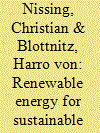|
|
|
Sort Order |
|
|
|
Items / Page
|
|
|
|
|
|
|
| Srl | Item |
| 1 |
ID:
116993


|
|
|
|
|
| Publication |
2012.
|
| Summary/Abstract |
Several measures to boost the energy system towards a low-carbon future can be planned and implemented by local authorities, such as energy-saving initiatives in public buildings and lighting, information campaigns, and renewable energy pilot projects. This work analyzes the public administration's role in energy and climate policies by assessing carbon-lowering measures for properties and services managed directly by local governments in central Italy.
Both short- and long-term schemes were considered in the analysis of local authority energy strategies. The MARKAL-TIMES energy model was applied to long-term energy planning to assess the effect of low-carbon initiatives on public-sector energy consumption up to 2030. Two energy scenarios were built, i.e. a Business As Usual (BAU) scenario based on current or soon-to-be-adopted national policies, and an Exemplary Public Scenario (EPS) including some further virtuous local policies suggested by local authorities.
Our results show that a 20% primary energy reduction can be achieved with respect to the baseline year by means of short-term energy policies (5-year time span), while a primary energy saving of about 30% can be reached with longer-term energy policies (25-year time span), even after taking the increase in energy demand into account.
This work goes to show the part that local governments can play in energy policy and their contribution to the achievement of climate goals.
|
|
|
|
|
|
|
|
|
|
|
|
|
|
|
|
| 2 |
ID:
111338


|
|
|
|
|
| Publication |
2012.
|
| Summary/Abstract |
This work presents three 25-year energy scenarios developed with the TIMES model generator for Pesaro, a seaside municipality in central Italy. It evaluates the effectiveness of local-scale energy policies in three sectors: households, transport, and the public sector (PS). Since the local energy demand is affected by summer tourism, seasonal consumption by holiday homes was also studied. Three scenarios were hypothesized: Business as Usual (BAU), Exemplary Public Sector (EPS), and Exemplary Municipality (EM). The EPS scenario models the exemplary role that recent European directives attribute to the PS in setting energy efficiency and technology penetration targets for itself; the EM scenario extends these targets to the household sector. In particular, the study underscores the potential of micro-cogeneration technologies in achieving local environmental targets, even though their diffusion would involve an increase in local energy consumption due to internalization of the primary energy used to produce electricity, which would no longer be wholly imported from outside municipal boundaries. The study provides information to local decision-makers by estimating the cost of implementing a number of energy policies. Finally, the study discusses the adequacy of TIMES as a tool to analyse municipal-scale scenarios.
|
|
|
|
|
|
|
|
|
|
|
|
|
|
|
|
| 3 |
ID:
094892


|
|
|
|
|
| Publication |
2010.
|
| Summary/Abstract |
It is widely recognised that access to and supply of modern energy play a key role in poverty alleviation and sustainable development. The emerging concept of energisation seems to capture this idea; however, there is no unified definition at the point of writing. In this paper, the aim is to propose a new and comprehensive definition of the concept of energisation. The chronological development of this concept is investigated by means of a literature review, and a subsequent critique is offered of current definitions and usage of the concept. Building upon these first insights, two planned cases of energisation in post-apartheid South Africa are contrasted to an unplanned one: they are the national electrification programme, the integrated energy centres initiative, and a wood fuelled local economy in Khayelitsha, Cape Town's biggest township. Especially the latter case, based on original data collection by the authors, provides a new understanding of specific elements affecting energisation. Finally, a new and detailed definition of the concept of sustainable energisation is developed by systematically reiterating three key elements: the target group, the concept of energy services, and sustainable development.
|
|
|
|
|
|
|
|
|
|
|
|
|
|
|
|
|
|
|
|
|